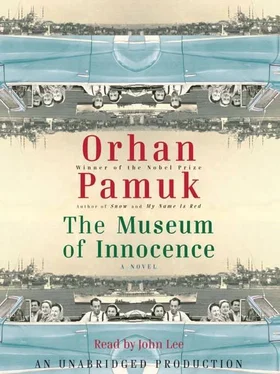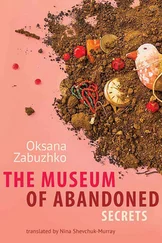Kissing still, we left the kitchen and sat down on the edge of the bed, and with scarcely any coyness, though never once looking each other in the eye, we took off most of our clothes and slipped under the blanket. The rough blanket was too heavy and scratched my skin, just as it had done when I was a child, so after a while I pulled it off, and we lay there, half naked. We were both perspiring, and for some reason this relaxed us. The sun filtering through the drawn curtains was a yellowish orange, and that made her moist skin look more tanned than it was. That Füsun could look at my body as I could hers, that she could gaze down at my nether regions so near her without panicking, that, far from finding it strange, she could even look at my sex with calm desire and something akin to tenderness-seemed proof enough that she had seen other men naked in other beds, on divans and car seats, and that made me jealous.
Soon the worried looks we were giving each other betrayed how daunted we both were by the difficult task we’d set ourselves. Füsun removed her earrings (one of which is now the first exhibit in our museum) and placed them on the side table. She did this as carefully as a nearsighted girl might remove her glasses before swimming, and once again I sensed her determination. In those days it was the style for young people to wear bracelets, necklaces, and rings bearing their names or initials but that afternoon I didn’t notice if her earrings were of this kind. But once she had peeled off her outer garments item by item, she removed her little panties in the same purposeful manner and I saw the indisputable evidence of what she was prepared to do. In those days, girls who did not wish to “go all the way” were in the habit of keeping at least their panties on, as Western girls might when trying to sun themselves.
I kissed her shoulders, which smelled of almond, and with my tongue I felt her damp velvety skin, and when I saw that even by May her breasts were one shade lighter than her robust Mediterranean skin, I shivered. If the lycée teachers studying this book in their class are now beginning to get nervous, they can advise the students to skip this page. If there are visitors to my museum who wish to know more, I would suggest that they kindly cast their eyes on the furnishings; the scene will be enough to make them understand that what I had to do I did first and foremost for Füsun, looking at me with such frightened and sorrowful eyes, and second for our common good, and only after all these imperatives were satisfied, just a little for my own pleasure. It was as if we were hoping to overcome an obstacle that life had thrown in our way. So as her eyes stared into mine and as I pressed against her uttering tender words, asking, Does it hurt, darling?, her silence did not alarm me. At the moment when we were closest I felt the fragility of her trembling so deeply (think of sunflowers quivering in a faint breeze) it was as if her pain became mine.
Seeing her eyes slip away to examine the lower regions of her body with a doctor’s scrutiny, I understood that she wanted to experience this alone, and I wanted to finish what I was doing, to concentrate on my own satisfaction so that I could emerge from this arduous challenge feeling some relief. By now we both intuitively knew that to savor fully the pleasures that would bind us together meant to savor them in solitude as well; in that merciless embrace, greedy and unsparing, we were using each other for our own pleasure. There was something about the way Füsun pressed her fingers into my back; it made me think of that innocent, nearsighted girl learning how to swim in the sea, so fearful as she clung to her father who rushed out to save her when she feared she might drown. Ten days later, as she was embracing me with her eyes closed, I asked her what film she might be watching in her mind. “I was watching a field of sunflowers,” she told me.
The boys whose joyful shouts and curses and screeches would accompany our lovemaking in the days that followed were there too that first day, playing football in the old garden of Hayrettin Pasha ’s derelict mansion, cursing and screeching while in the house we made love. When they stopped their chatter for a while, a marvelous silence fell over the room, broken only by a few shy gasps from Füsun, and one or two happy moans that escaped me. In the distance we could hear the policeman’s whistle in Nişantaşı Square, and car horns, and a hammer hitting a nail: A child kicked a can, a seagull mewed, a cup broke, the leaves of the plane trees rustled in the breeze.
We were lying in the silent room with our arms around each other, trying to banish thoughts of the bloody sheet, the discarded clothes, our still unaccustomed nakedness-all those primitive social rituals and embarrassing details that anthropologists so like to analyze and classify. Füsun for a while had cried silently. She had paid little attention to my words of consolation, only saying that she would remember this day till the end of her life, before beginning to cry again, and then falling silent once more.
Having become-with the passage of time-the anthropologist of my own experience, I have no wish to disparage those obsessive souls who bring back crockery, artifacts, and utensils from distant lands and put them on display for us, the better to understand the lives of others and our own. Nevertheless, I would caution against paying too much attention to the objects and relics of “first love,” for these might distract the viewer from the depth of compassion and gratitude that now arose between us. So it is precisely to illustrate the solicitude in the caresses that my eighteen-year-old lover bestowed upon my thirty-year-old skin as we lay quietly in this room in each other’s arms, that I have chosen to exhibit this floral batiste handkerchief, which she had folded so carefully and put in her bag that day but never removed. Let this crystal inkwell and pen set belonging to my mother that Füsun toyed with that afternoon, noticing it on the table while she was smoking a cigarette, be a relic of the refinement and the fragile tenderness we felt for each other. Let this belt whose oversize buckles that I had seized and fastened with a masculine arrogance that I felt so guilty for afterwards bear witness to our melancholy as we covered our nakedness and cast our eyes about the filth of the world once again.
Before leaving, I told Füsun that if she wanted to win a university place, she was going to have to work very hard during this final month and a half.
“Are you worried I’ll be a shopgirl forever?” she said with a smile.
“Of course not… But I’d like to tutor you for the exam… We could work here. Which books are you using? Are you studying classical mathematics or modern?”
“At lycée we did classical. But we’re doing both in my course. Because the answers are matched in the answer sheet. The whole thing makes my head spin.”
We agreed to meet the next day in the same place to work on mathematics. As soon as she was gone I bought the books they used in the lycée and the course from a bookstore in Nişantaşı; once back in the office I leafed through them as I smoked a cigarette, and I saw that I would actually be able to help her. The thought that I might be able to tutor Füsun in mathematics lightened the emotional burden and left me with a feeling of joy and a strange sort of pride. My neck, my nose, my skin, all ached with happiness, an exultation that I could not hide from myself. In one corner of my mind I kept thinking that Füsun and I would be meeting many more times in the Merhamet Apartments to make love. But I understood that the only way I could carry this off would be to act as if nothing out of the ordinary were happening.
10 City Lights and Happiness
Читать дальше












